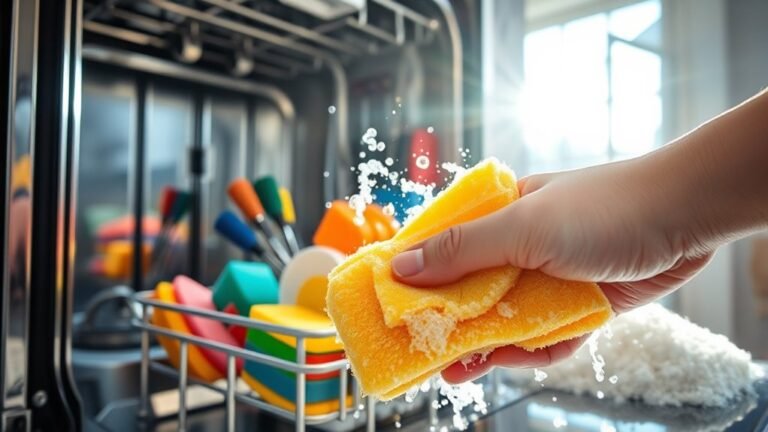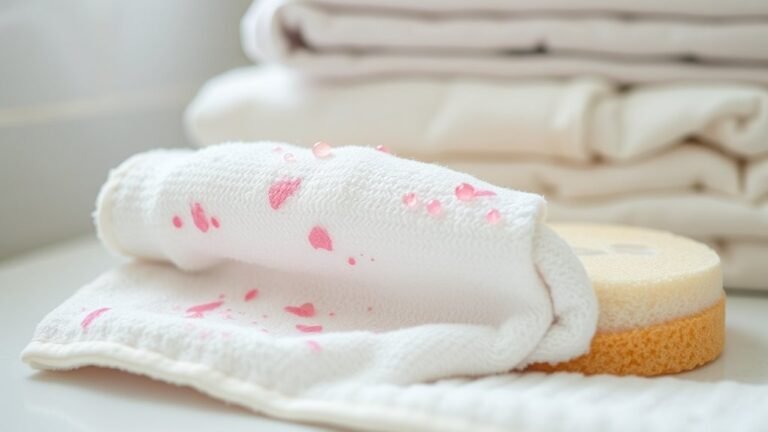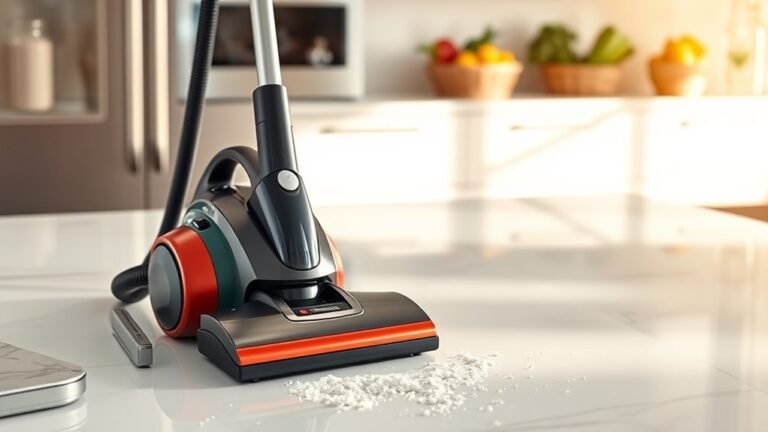Cleaning Your Dishwasher for Optimal Performance
You should clean your dishwasher regularly to keep it running smoothly and your dishes spotless. Start by removing and rinsing the filter, then clear any clogs in spray arms and nozzles. Wipe down the door and gasket to prevent odors and leaks, and run a vinegar or baking soda cycle to eliminate buildup. Checking the drainage system helps avoid water pooling. Keeping up with these steps prevents problems and extends your dishwasher’s lifespan—there’s more you can do to optimize its performance.
Why Regular Dishwasher Cleaning Is Important
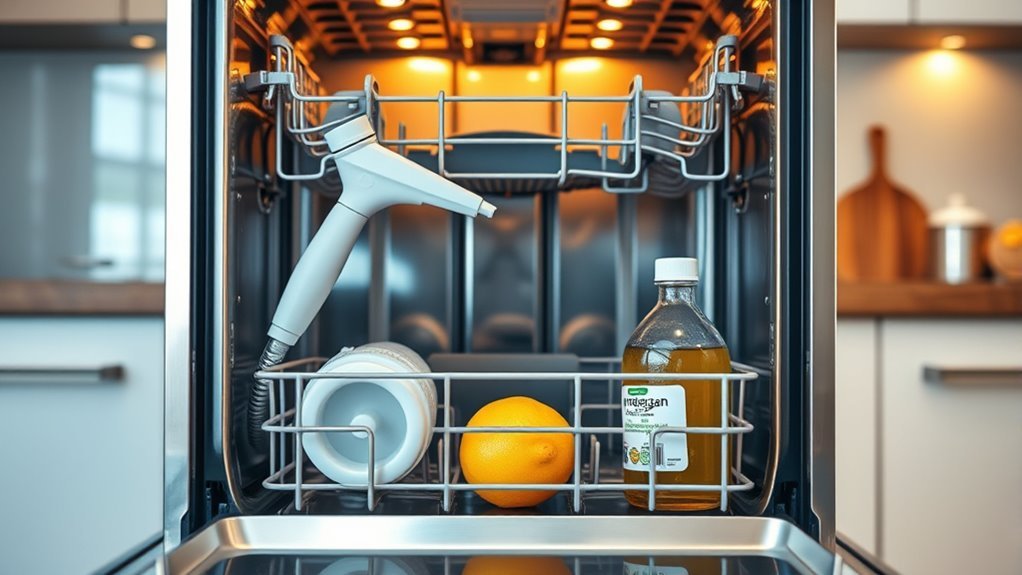
Regularly cleaning your dishwasher is essential to keep it running efficiently and to guarantee your dishes come out spotless. By sticking to a proper cleaning frequency, you avoid buildup of food particles, grease, and soap scum that can cause odors and reduce performance. Dishwasher maintenance isn’t just about aesthetics; it directly impacts how well your machine cleans and how long it lasts. When you keep your dishwasher in top shape, you save yourself from costly repairs and the hassle of re-washing dishes. Plus, a clean dishwasher means fewer energy and water resources wasted, giving you more freedom to focus on what matters. So, make regular cleaning a non-negotiable part of your routine to enjoy spotless dishes and a dependable appliance.
Gathering the Supplies You’ll Need
Before you start cleaning, make sure you have the right tools like a sponge, brush, and cloth. You’ll also need recommended cleaning agents such as vinegar or dishwasher cleaner to tackle grime effectively. Don’t forget to prepare safety gear like gloves to protect your hands during the process.
Essential Cleaning Tools
To clean your dishwasher effectively, you’ll need a few essential tools that make the job easier and more thorough. Start with cleaning brushes designed to reach tight spots like spray arms and filter areas, helping you remove stubborn grime with ease. Microfiber cloths are also a must-have; they’re perfect for wiping down the door seals and interior surfaces without scratching. Having these tools on hand lets you tackle buildup quickly and keeps your dishwasher running smoothly. You don’t want to be stuck scrubbing with the wrong items or missing hidden messes. With the right cleaning brushes and microfiber cloths, you’ll enjoy a hassle-free process and the freedom to maintain your dishwasher’s peak performance without fuss.
Recommended Cleaning Agents
A few carefully chosen cleaning agents can make all the difference when it comes to keeping your dishwasher spotless and odor-free. You’ve got options: natural cleaners like white vinegar and baking soda work wonders without harsh chemicals, giving you the freedom to clean safely and sustainably. These natural solutions effectively break down grime and neutralize odors. On the other hand, chemical cleaners are designed for a deep, thorough clean, targeting tough buildup and disinfecting your appliance quickly. Whether you prefer natural cleaners or chemical cleaners depends on your comfort level and cleaning goals. Having both on hand lets you tackle different levels of dirt and maintain your dishwasher’s performance without feeling restricted by your options or your cleaning routine.
Safety Gear Preparation
While cleaning agents do the heavy lifting, having the right safety gear guarantees you protect yourself throughout the process. Before you plunge in, grab a pair of safety gloves to shield your hands from harsh chemicals and grime. These gloves give you the freedom to scrub confidently without worrying about irritation or cuts. Don’t forget eye protection, either—splashing cleaning agents can be risky, and goggles or safety glasses keep your eyes safe and clear. Preparing this gear assures you stay comfortable and injury-free, letting you focus on the job without distractions. Taking these simple precautions means you’re in control, maintaining your dishwasher’s performance while safeguarding your well-being every step of the way.
Removing and Cleaning the Dishwasher Filter
First, you’ll need to locate the dishwasher filter, usually found at the bottom of the appliance. Once you’ve removed it, rinse off any food particles under running water. Cleaning the filter regularly helps keep your dishwasher running efficiently.
Locating the Dishwasher Filter
Because the dishwasher filter traps food particles and debris, keeping it clean is essential for your appliance’s performance. To get started, you’ll want to locate the filter first. Usually, it’s found at the bottom of the dishwasher, right under the lower spray arm. This common filter location makes it easy to access. Some models have a cylindrical or flat filter that you can twist or lift out without tools. Ensuring filter accessibility means you won’t have to struggle or dismantle parts just to reach it. Take a moment to check your dishwasher’s manual if you’re unsure. Knowing exactly where your filter is and how to reach it gives you the freedom to maintain your dishwasher regularly and keep it running smoothly.
Steps to Clean Filter
To clean your dishwasher filter effectively, you’ll need just a few simple tools and about 10 minutes. Start by removing the bottom rack to access the filter. Twist and lift the filter out carefully—this is key to good filter maintenance. Rinse it under warm water, using a soft brush to clear away debris. Regular filter cleaning prevents clogging and guarantees your dishwasher runs freely. If your filter looks worn or damaged, consider filter replacement for peak performance.
| Step | Action |
|---|---|
| 1. Remove Filter | Twist and lift out from base |
| 2. Clean Filter | Rinse with warm water, brush |
| 3. Inspect & Replace | Check for damage, replace if needed |
Keep your freedom from buildup with this simple routine.
Cleaning the Spray Arms and Nozzles

When you clean the spray arms and nozzles, you’re making certain your dishwasher can reach every corner of your dishes with a powerful stream of water. Start by removing the spray arms carefully from your dishwasher. Check the nozzles for any clogs or mineral buildup that can block water flow. Use a toothpick or small brush for nozzle cleaning, clearing out any debris. Rinse the spray arms under running water to flush out loosened particles. Performing regular spray arm maintenance guarantees your dishwasher sprays water evenly and efficiently, freeing you from hand-washing chores. Once cleaned, snap the spray arms back in place securely. This simple routine keeps your dishwasher running smoothly and ensures your dishes come out spotless every time.
Wiping Down the Door and Gasket
Although you might overlook it, wiping down the dishwasher door and gasket is essential for preventing leaks and unpleasant odors. Regular door cleaning keeps grime and food particles from building up, while gasket maintenance guarantees a tight seal, protecting your kitchen floor from water damage.
Here’s how you can stay on top of it:
- Use a damp cloth with mild soap to wipe the door edges and inside surface.
- Check the gasket for cracks or debris, gently cleaning it with a soft cloth.
- Dry the gasket thoroughly after cleaning to prevent mold and mildew growth.
Running a Vinegar Wash Cycle
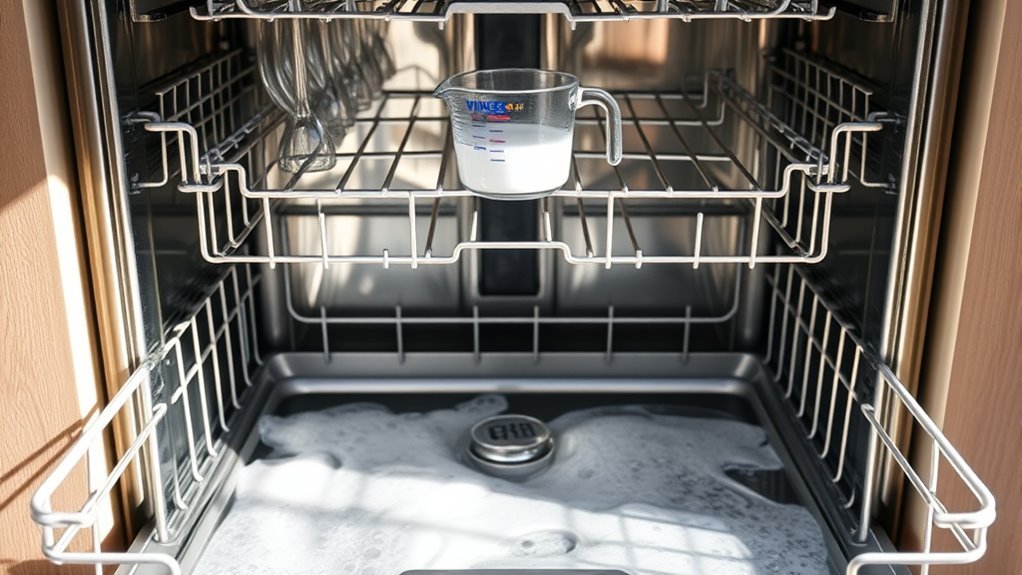
Keeping the door and gasket clean sets the stage for a more thorough dishwasher refresh. Now, it’s time to harness the vinegar benefits by running a vinegar wash cycle. Simply place a cup of white vinegar in a dishwasher-safe container on the top rack. Run a hot water wash cycle without any detergent or dishes inside. This process loosens grime, dissolves mineral buildup, and helps eliminate unpleasant odors, leaving your dishwasher fresh and efficient. Vinegar’s natural acidity tackles residue that ordinary rinses miss, boosting your dishwasher’s performance without harsh chemicals. Make this vinegar wash cycle a regular habit to keep your appliance running smoothly and to enjoy the freedom of a clean, odor-free dishwasher every time you load it.
Using Baking Soda to Eliminate Odors
Anyone looking to tackle lingering smells in their dishwasher can turn to baking soda as a simple yet effective solution. Baking soda benefits include its natural ability to neutralize odors without harsh chemicals, making it perfect for odor elimination in your appliance. To use it, sprinkle a cup of baking soda on the bottom of your empty dishwasher. Then, run a short, hot water cycle. This process helps break down residue and refresh the interior.
Here’s why baking soda is your best friend for dishwasher freshness:
- It’s safe and eco-friendly, so you maintain control over what’s inside your home.
- It’s inexpensive and easy to find, giving you freedom from costly cleaners.
- It keeps your dishwasher smelling clean between deep cleans.
Checking and Clearing the Drainage System
Before you run into drainage problems, it’s important to regularly check and clear your dishwasher’s drainage system. Drainage blockages can cause water to pool, affecting cleaning performance and causing unwanted odors. By sticking to a proper cleaning frequency, you free yourself from inconvenient breakdowns.
Here’s a quick guide to help you stay on track:
| Task | Recommended Cleaning Frequency |
|---|---|
| Inspect drain filter | Weekly |
| Clear food debris from drain | Weekly |
| Check drain hose for clogs | Monthly |
Regularly removing trapped food and debris keeps your dishwasher draining smoothly. Don’t wait until water backs up—make these checks part of your routine and enjoy the freedom of a dishwasher that works efficiently every cycle.
Tips for Maintaining Your Dishwasher Between Cleanings
To keep your dishwasher running smoothly, you’ll want to adopt some simple daily habits. Regularly wiping down the door seals and leaving the door slightly open can help prevent odors and buildup. These small steps make a big difference between deep cleanings.
Daily Maintenance Habits
Five simple daily habits can keep your dishwasher running smoothly between deep cleanings. By incorporating these into your daily cleaning routine, you’ll extend its lifespan and enjoy hassle-free washes. Treat your dishwasher like a trusted tool that deserves a little attention each day.
Here’s a quick maintenance checklist to follow daily:
- Rinse off food scraps before loading dishes to prevent clogs.
- Check and empty the filter regularly to avoid buildup.
- Wipe down the door edges and gasket to maintain a tight seal.
Sticking to these habits means less worry about performance issues and more freedom from unexpected repairs. Daily maintenance doesn’t have to be a chore—it’s your ticket to effortless dishwashing.
Preventing Odors and Build-up
Although regular use keeps your dishwasher busy, it can still develop unpleasant odors and buildup if you don’t take a few simple steps between deep cleanings. To prevent odor sources, always scrape off leftover food before loading dishes. Regularly check and clean the filter, as trapped debris is a primary culprit. Wiping down the door seals and edges helps stop mold and grime from settling. Running a quick rinse cycle with vinegar or a dishwasher cleaner once a week can keep odors at bay and support build up prevention. Avoid letting dirty dishes sit inside for long periods, as this contributes to unpleasant smells. By staying on top of these easy habits, you’ll maintain a fresh, efficient dishwasher without feeling tied down by constant upkeep.
Signs Your Dishwasher Needs a Deep Clean
If your dishes aren’t coming out as clean as they used to, it’s a clear sign your dishwasher could use a deep clean. You might notice clogged drains slowing down the water flow or foul odors lingering inside, both signals that buildup is taking over. Ignoring these signs can limit your dishwasher’s freedom to work efficiently.
When dishes aren’t clean and odors persist, it’s time for a deep dishwasher clean to restore efficiency.
Here are key signs you shouldn’t ignore:
- Dishes still feel greasy or have stuck-on food after a cycle
- Water pools at the bottom, indicating drainage issues
- Persistent bad smells even after running a cleaning cycle
When you spot these, it’s time to take action and restore your dishwasher’s performance so you can enjoy hassle-free cleaning again.
Frequently Asked Questions
Can Dishwasher Cleaning Improve Water Efficiency?
Yes, dishwasher cleaning can improve water efficiency by ensuring your appliance runs smoothly. When you keep up with regular dishwasher maintenance, you prevent clogs and buildup that cause your machine to work harder and use more water. By maintaining it well, you’ll reduce unnecessary water usage, giving you more control and freedom over your household resources while saving on utility bills. It’s a smart, simple way to boost efficiency.
Are Dishwasher Cleaning Tablets Better Than Natural Cleaners?
You might wonder if dishwasher cleaning tablets outperform natural cleaners. Tablets often offer stronger cleaning effectiveness, boosting dishwasher performance by tackling tough grime and limescale. However, if you prefer freedom from chemicals and want a gentler, eco-friendly option, natural cleaners can still do a decent job with regular use. Ultimately, it’s about balancing your cleaning needs with your values—choose what fits your lifestyle and keeps your dishwasher running smoothly.
How Often Should Dishwasher Seals Be Replaced?
Imagine a tight seal holding everything in or a worn-out gasket leaking everywhere. That contrast shows why seal maintenance is key. You don’t have to replace dishwasher seals often—usually every 3 to 5 years—but keep an eye out for replacement signs like cracks, brittleness, or leaks. If you notice any, don’t wait. Swapping out the seal frees you from worries about water damage and keeps your machine running smoothly.
Does Hard Water Affect Dishwasher Cleaning Frequency?
Yes, hard water definitely affects how often you’ll need to do dishwasher maintenance. The minerals in hard water can leave deposits inside your machine, making it less effective over time. You’ll want to clean your dishwasher more frequently to prevent buildup and keep it running smoothly. Staying on top of this means less hassle and more freedom to enjoy your clean dishes without extra worry or effort.
Can I Use Bleach to Sanitize My Dishwasher?
You might wonder if you can use bleach to sanitize your dishwasher. While bleach can be effective, you’ve got to be cautious with bleach safety—it can damage rubber seals and metal parts inside your dishwasher. Instead, consider using dishwasher-safe sanitizers designed for dishwasher maintenance. This way, you’ll keep your appliance running smoothly without risking damage. Remember, freedom means choosing safe, effective solutions that protect both you and your machine.



